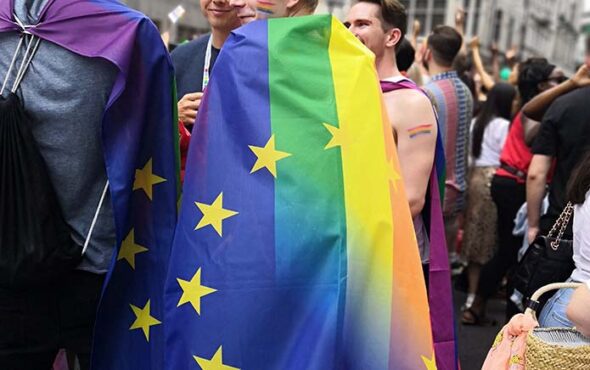
Twenty countries in the European Union have called on Hungary to repeal its archaic ban on Pride and other LGBTQIA+ events.
Earlier this year, Hungarian lawmakers passed two pieces of legislation that further restricted the rights of the country’s LGBTQIA+ residents.
In March, the ruling Fidesz party submitted a bill that would make it illegal to organise or attend events that violate Hungary’s “child protection“ laws, which prohibit the “depiction or promotion“ of homosexuality to those under 18.
The legislation also allows police to use facial recognition cameras to identify individuals attending the events and give out fines of up to 200,000 Hungarian forints.
After being introduced in the parliament, the measure was swiftly passed and signed into law by the country’s ultra-conservative Prime Minister Viktor Orbán.
A few weeks later, lawmakers passed an amendment to Hungary’s constitution, banning LGBTQIA+ public events and declaring that only two genders – male and female – would be recognised.
In response to the draconian law and amendment, LGBTQIA+ organisations, activists and allies have slammed the government and Orbán, with many taking to the streets to protest.
The horrific pieces of legislation have caught the attention of 20 EU countries, who have urged Hungary to revise its harmful measures in a statement released on 27 May.
“We are highly alarmed by these developments which run contrary to the fundamental values of human dignity, freedom, equality and respect for human rights, as laid down in Artice 2 of the Treaty of the European Union,” they wrote.
“Respecting and protecting the human rights and fundamental freedoms of all people, including LGBTIQ+ persons, is inherent in being part of the European family. This is our responsibility and the shared commitment of the member states and the European institutions.
“We therefore call upon Hungary to revise these measures to ensure the human rights and fundamental freedoms of all its citizens are respected and protected, thus complying with its international obligations.”
The declaration was backed by France, Germany, Ireland, Greece, Netherlands, Portugal, Slovenia, Spain, Sweden, Czechia, Cyprus, Belgium, Austria, Luxembourg, Malta, Estonia, Finland, Slovenia, Latvia and Lithuania.
In addition to the joint statement, EU affairs ministers met in Brussels that same day to discuss Hungary’s harmful and anti-LGBTQIA+ laws.
“I think it’s time that we consider the next steps, because this is getting pointless in continuing these hearings,” EU affairs minister of Sweden Jessica Rosencrantz, told the Associated Press.
“[The EU is] not a geographical union but a union based on values, and in that sense, we have to act strongly against countries not living up to our common principles.”
In a world trying to erase LGBTQIA+ stories, we keep writing them. Join our mission as shareholders in Gay Times and help us fight for your rights. Find out more at investors.gaytimes.com.



